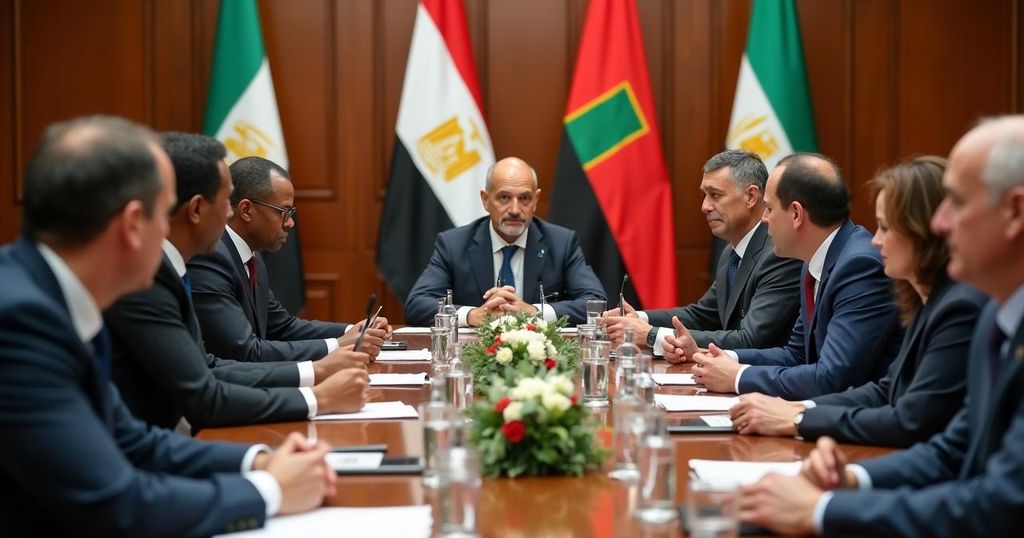Emerging Alliance: Eritrea, Egypt, and Somalia Unite Against Ethiopia

Leaders of Eritrea, Egypt, and Somalia convened in Asmara, marking the establishment of a united front against Ethiopia, amid ongoing tensions over regional sovereignty and territorial disputes. Diplomatic strains have driven Somalia closer to Egypt and Eritrea, while military support from Egypt suggests escalated cooperation against shared threats. This geopolitical shift is indicative of broader issues, including Ethiopia’s ambitions for port access and long-standing disputes over the Nile River.
A recent summit involving the leaders of Eritrea, Egypt, and Somalia in Asmara has solidified their coalition against Ethiopia. This gathering facilitated discussions centered around regional sovereignty and security, likely alluding to Ethiopia’s pursuit of port access. Ongoing diplomatic tensions have fostered closer ties between Somalia, Egypt, and Eritrea, particularly in light of Ethiopia’s controversial agreements concerning Somaliland and its long-standing Nile dam dispute with Egypt. Hassan Khannenje, director of the Horn International Institute for Strategic Studies, characterized the developments as an axis directed against Addis Ababa, indicating a collective effort to intensify pressure on Ethiopia. A photograph of the meeting depicted Eritrean President Isaias Afwerki alongside Egyptian President Abdul Fattah al-Sisi and Somali President Hassan Sheikh Mohamud, with a joint statement emphasizing the enhancement of Somali state institutions to address internal and external challenges. Egypt’s recent military support to Somalia—marked by the delivery of military equipment—denotes a growing alignment between the three nations, particularly in confronting shared issues such as terrorism and regional security instability, exacerbated by Ethiopia’s civil unrest and territorial ambitions. Despite a previous peace agreement between Ethiopia and Eritrea in 2018, relations have soured again, especially following the Ethiopian civil war and Abiy Ahmed’s declared interest in securing a port on the Red Sea.
The geopolitical landscape of the Horn of Africa remains complex and fraught with historical grievances and territorial disputes. Ethiopia has long been a significant player in the region, supporting the Somali government against al-Shabab, but its relations with Somalia have recently soured due to Ethiopia’s dealings with Somaliland. Furthermore, the Nile River dispute has heightened tensions between Ethiopia and Egypt, both reliant on its waters. The summit in Asmara signifies a realignment among Eritrea, Egypt, and Somalia—nations with contentious relationships with Ethiopia—resulting in a united front that could potentially destabilize the region further. Historical conflict between Ethiopia and Eritrea, despite a peace agreement in 2018, continues to cast a shadow over regional relations, intensifying the complexities of alliances in this area.
The recent meeting in Asmara among the leaders of Eritrea, Egypt, and Somalia represents a significant shift in regional dynamics, fostering a coalition against Ethiopia amidst rising tensions. The motivations behind these strengthened ties are deeply rooted in historical disputes, particularly regarding territorial integrity, military cooperation, and resource control. As these nations align against Ethiopia, the prospects for regional stability may be increasingly jeopardized, particularly with ongoing external pressures and internal challenges faced by the Somali Federal Government. Moving forward, the implications of this summit will be critical to monitor as they unfold within the broader geopolitical context of the Horn of Africa.
Original Source: www.bbc.co.uk





